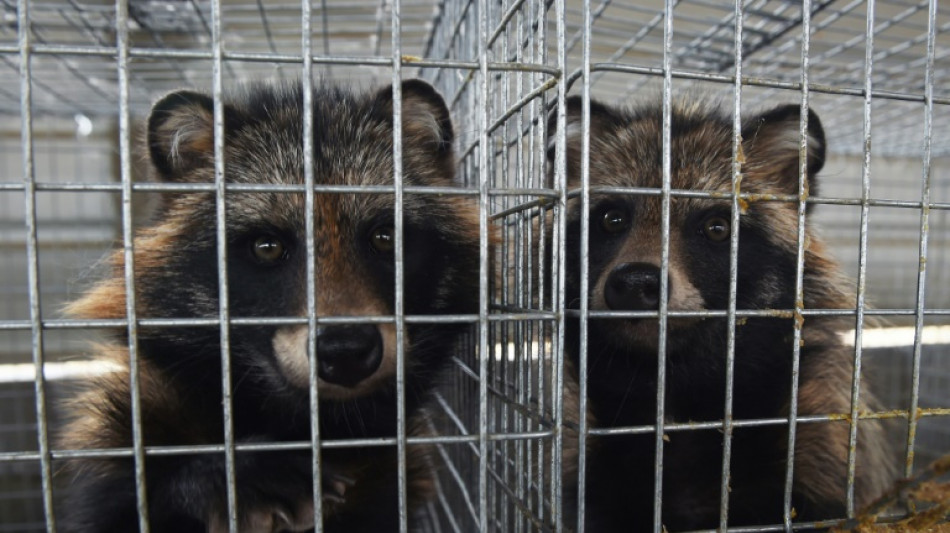
-
 Twenty wickets fall on day one as Australia gain edge in 4th Ashes Test
Twenty wickets fall on day one as Australia gain edge in 4th Ashes Test
-
'No winner': Kosovo snap poll unlikely to end damaging deadlock

-
 Culture being strangled by Kosovo's political crisis
Culture being strangled by Kosovo's political crisis
-
Main contenders in Kosovo's snap election

-
 Australia all out for 152 as England take charge of 4th Ashes Test
Australia all out for 152 as England take charge of 4th Ashes Test
-
Boys recount 'torment' at hands of armed rebels in DR Congo

-
 Inside Chernobyl, Ukraine scrambles to repair radiation shield
Inside Chernobyl, Ukraine scrambles to repair radiation shield
-
Bondi victims honoured as Sydney-Hobart race sets sail

-
 North Korea's Kim orders factories to make more missiles in 2026
North Korea's Kim orders factories to make more missiles in 2026
-
Palladino's Atalanta on the up as Serie A leaders Inter visit

-
 Hooked on the claw: how crane games conquered Japan's arcades
Hooked on the claw: how crane games conquered Japan's arcades
-
Shanghai's elderly waltz back to the past at lunchtime dance halls

-
 Japan govt approves record 122 trillion yen budget
Japan govt approves record 122 trillion yen budget
-
US launches Christmas Day strikes on IS targets in Nigeria

-
 Australia reeling on 72-4 at lunch as England strike in 4th Ashes Test
Australia reeling on 72-4 at lunch as England strike in 4th Ashes Test
-
Too hot to handle? Searing heat looming over 2026 World Cup

-
 Packers clinch NFL playoff spot as Lions lose to Vikings
Packers clinch NFL playoff spot as Lions lose to Vikings
-
Guinea's presidential candidates hold final rallies before Sunday's vote

-
 BondwithPet Expands B2B Offering with Custom Pet Memorial Product
BondwithPet Expands B2B Offering with Custom Pet Memorial Product
-
Best Crypto IRA Companies (Rankings Released)

-
 Eon Prime Intelligent Alliance Office Unveils New Brand Identity and Completes Website Upgrade
Eon Prime Intelligent Alliance Office Unveils New Brand Identity and Completes Website Upgrade
-
Villa face Chelsea test as Premier League title race heats up

-
 Spurs extend domination of NBA-best Thunder
Spurs extend domination of NBA-best Thunder
-
Malaysia's Najib to face verdict in mega 1MDB graft trial

-
 King Charles calls for 'reconciliation' in Christmas speech
King Charles calls for 'reconciliation' in Christmas speech
-
Brazil's jailed ex-president Bolsonaro undergoes 'successful' surgery

-
 UK tech campaigner sues Trump administration over US sanctions
UK tech campaigner sues Trump administration over US sanctions
-
New Anglican leader says immigration debate dividing UK

-
 Russia says made 'proposal' to France over jailed researcher
Russia says made 'proposal' to France over jailed researcher
-
Bangladesh PM hopeful Rahman returns from exile ahead of polls

-
 Police suspect suicide bomber behind Nigeria's deadly mosque blast
Police suspect suicide bomber behind Nigeria's deadly mosque blast
-
AFCON organisers allowing fans in for free to fill empty stands: source

-
 Mali coach Saintfiet hits out at European clubs, FIFA over AFCON changes
Mali coach Saintfiet hits out at European clubs, FIFA over AFCON changes
-
Last Christians gather in ruins of Turkey's quake-hit Antakya

-
 Pope Leo condemns 'open wounds' of war in first Christmas homily
Pope Leo condemns 'open wounds' of war in first Christmas homily
-
Mogadishu votes in first local elections in decades under tight security

-
 'Starting anew': Indonesians in disaster-struck Sumatra hold Christmas mass
'Starting anew': Indonesians in disaster-struck Sumatra hold Christmas mass
-
Cambodian PM's wife attends funerals of soldiers killed in Thai border clashes

-
 Prime minister hopeful Tarique Rahman arrives in Bangladesh: party
Prime minister hopeful Tarique Rahman arrives in Bangladesh: party
-
Pacific archipelago Palau agrees to take migrants from US

-
 Pope Leo expected to call for peace during first Christmas blessing
Pope Leo expected to call for peace during first Christmas blessing
-
Australia opts for all-pace attack in fourth Ashes Test

-
 'We hold onto one another and keep fighting,' says wife of jailed Istanbul mayor
'We hold onto one another and keep fighting,' says wife of jailed Istanbul mayor
-
North Korea's Kim visits nuclear subs as Putin hails 'invincible' bond

-
 Trump takes Christmas Eve shot at 'radical left scum'
Trump takes Christmas Eve shot at 'radical left scum'
-
3 Factors That Affect the Cost of Dentures in San Antonio, TX

-
 Leo XIV celebrates first Christmas as pope
Leo XIV celebrates first Christmas as pope
-
Diallo and Mahrez strike at AFCON as Ivory Coast, Algeria win

-
 'At your service!' Nasry Asfura becomes Honduran president-elect
'At your service!' Nasry Asfura becomes Honduran president-elect
-
Trump-backed Nasry Asfura declared winner of Honduras presidency


Dozens of viruses detected in Chinese fur farm animals
Dozens of viruses have been detected mixing in animals at fur farms in China, some of which are new and have the potential to spill over into humans, researchers said Wednesday.
Since the Covid-19 pandemic, scientists have been warning that farming mammals such as minks for their fur could make it easier for new viruses to cross over from the wild and spark fresh outbreaks.
Virologist Edward Holmes, who has led research into Covid-19, told AFP he felt that the global fur farming industry "is one most likely ways by which a new pandemic will start".
"Personally, I think the fur farming industry globally should be closed down," he added.
Holmes is a co-author of a new study looking at the potential danger posed by viruses in fur farms in the country where the first Covid cases emerged in late 2019.
The Chinese-led team of researchers sequenced the genetic material from lung and intestine samples of 461 animals such as minks, rabbits, foxes and raccoon dogs that died from disease across the nation between 2021 and 2024.
Most were from fur farms, some were also farmed for food or traditional medicine, while around 50 were wild animals.
The team detected 125 viruses, including 36 new ones, according to the study in the journal Nature.
Thirty-nine of the viruses have a "high risk" of jumping across species, including to humans, the researchers evaluated.
Some of those viruses -- such as hepatitis E and Japanese encephalitis -- have already spread to humans, but 13 were new, the study said.
Several types of bird flu were also detected in guinea pigs, minks and muskrats.
And seven types of coronaviruses were also spotted -- though none were closely related to SARS-CoV-2, which causes Covid.
- 'Alarm bell' virus -
The virus that most concerned Holmes was the "Pipistrellus bat HKU5-like virus". It had previously been detected in bats but was found in the lungs of two farmed minks.
It is a relative of the Middle East respiratory syndrome coronavirus (MERS), which can be deadly to humans.
"That we now see that it jumped from bats to farmed mink must serve as an alarm bell," said Holmes, who is a professor at the University of Sydney.
"This virus needs to be monitored."
Thousands of unknown viruses are believed to be circulating among wild mammals. Scientists fear that fur farms could allow farmed animals to catch such viruses, which could in turn expose humans.
The leading theory for the origin of Covid is that it began in bats, then was transmitted to humans during the trade of wild animals.
"I strongly believe that the wildlife trade was responsible for the emergence of SARS-CoV-2," Holmes said.
"And I think that the related fur farming trade could easily result in another pandemic virus," he added.
In the study, the researchers called for increased surveillance of fur farm animals -- particularly for minks, raccoon dogs and guinea pigs, which recorded the most "high risk" viruses.
Denmark culled its entire farmed mink population over Covid fears in 2020, but has since reauthorised the practice.
L.Miller--AMWN


